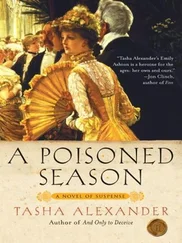“I understand all too well,” I said. She asked no questions, required no explanation, but took my hand and squeezed it. “How old was she?”
“The gardener’s girl?” she asked. I nodded. “Three, maybe four.”
“Where do they live now?”
“Oh, I don’t know. We gave him an excellent reference. I’ve no doubt he easily found another position.”
“How long ago was this?”
“Ages ago,” she said. “At least six years.”
Which meant, clearly, that the little girl in the window could not have been the gardener’s daughter. I remembered what Monsieur Leblanc had told us about the ghostly child searching for a mother and shuddered, unsure why I wasn’t able to immediately dismiss what I’d seen as a silly offshoot of a ridiculous tale. But something in me, deep and instinctual, screamed to me there was more to the story.
“Gaudet has officially asked me to help him find Capet.” Colin’s dark eyes flashed serious. It was late and we were snuggled in bed, both of us reading as rain pounded the glass beyond our shutters. I was finding Madame Bovary a different book than I remembered, and credited my happy marriage with the change in my opinion. Instead of sympathizing with Emma, I found myself despising her husband and caring nothing for her. I closed the book.
“Have you lost faith in him?” I asked.
“He was on the verge of declaring the search a failure.”
“So soon?”
“He’s interviewed everyone in the village and no one admits to seeing anything suspicious. Which means, in his mind, that your friend the thief has vanished—he assumes to Paris—never to be seen again.”
“It wouldn’t be the first time Sebastian has successfully eluded the authorities. Has Gaudet contacted his counterparts in Paris?”
“Only in the most perfunctory way. He’s ready to write the whole matter off as unsolved.”
“And what about you?” I asked.
“I want to interview Capet before I start throwing around accusations,” he said. “I do hope your indefatigable friend can offer a reasonable alibi.”
“Sebastian would never kill anyone.”
“I hope you’re right. But whoever did this is not to be trifled with. He’s a brutal, twisted individual,” he said. “This is not the first time there have been rumors of the Ripper striking in France. Until I’m confident Capet is not our man, I want you to be cautious in the extreme.”
“You think there will be more murders?” I asked.
“I can’t promise you there won’t be,” he said. His words scared me. I deposited my book on the bedside table and curled up next to my husband, grateful for the safety of his arms. I didn’t believe for a second that Sebastian was capable of such brutality, but nonetheless was unsettled, and I didn’t like the feeling in the least.
7 July 1892
I can’t say I much like being scolded by my son. He was quite firm with me yesterday over this business with his wife. I ought to expect it—it’s not fair of me to test his loyalty or push him to choose me over her. I’m well aware of that. But juvenile emotions do, on occasion, get the best of all of us. I sent him off with a copy of Madame Bovary for her. As she’s spent so much time traipsing about the countryside she’s bound to recognize the setting of the book, and I hope that by choosing what might be considered a controversial title she’ll recognize I’m attempting to consider her a woman of superior intellect and modern sensibilities. Whether she deserves such accolades remains to be seen. I long to be surprised by her.
She does not eat sweetbreads.
The situation began to deteriorate from the moment we awoke the next morning. A gnawing feeling in my stomach disturbed me soon after the sun rose, far earlier than I would have liked. I pulled on a soft dressing gown, threw open the shutters covering our bedroom windows, and watched a fine mist begin to lose its struggle with the light making its way through rapidly thinning clouds. Colin, who’d got up before me, stalked out of his dressing room almost as soon as he’d entered it. He was holding a note, from Sebastian, of course. It had been placed on top of the shoes he’d worn the day before and contained a brief message:
So sorry we couldn’t chat this evening.
I understand you’re looking for me.
My husband, usually all calmness and composure, turned ever so slightly red as he pressed the paper into my hand. “He was here again last night.”
I sighed. “It’s so very Sebastian.”
“He needs to stop.” I started to speak but he did not allow it. “Not, Emily, because I’m jealous or because I believe he’s a murderer. But he’s a person of interest in this investigation, and the sooner he presents himself with an alibi, the less chance he’ll have of being guillotined for the crime.”
I swallowed hard.
“I don’t mean to be harsh, my dear, but Sebastian’s games are not of use to anyone right now—particularly himself.”
“What can we do?” I asked.
“Eventually we shall have to find him.” He tucked a small notebook into his jacket packet, smoothed his lapels, and ran a hand through his thick hair. “He’s unlikely to have gone far. He doesn’t want to be away from you.”
“How do we begin?”
“We don’t. Not now anyway. I’ve got to meet Gaudet. Scotland Yard have asked for some details pertaining to the murder. If it’s the Ripper, clues from this crime might be instrumental in catching him.”
“What’s your opinion?”
“I would have expected him to keep to cities, given his methods so far. If—and it’s a big if—we’re dealing with the perpetrator of the Whitechapel murders, I’d be stunned if he’d chosen to stake out new territory in the countryside.”
“Is there anything at all I can do to help?” I asked.
“No. You’ve nothing to worry about today beyond amusing yourself.” Kissing me hard on the mouth, he said good-bye and headed down the stairs. I followed and watched from the landing above. His mother was calling to him, but he didn’t stop to reply; the front door thudded closed before the footman had time to realize he should have been there to open it in the first place.
Not wanting to draw my mother-in-law’s attention, I slipped back into the bedroom and rang for Meg to help me into a riding habit. I had no intention of staying in the house on my own until Cécile had awoken. After my maid was finished, I adjusted the smart tie and smoothed the snug jacket—single-breasted and cut like a gentleman’s—then tugged at my collar. I was nearly ready to go when Mrs. Hargreaves appeared in my dressing room without so much as knocking.
“Planning to escape, are you?” Her tone suggested a joke, but her eyes were severe. “A man purporting to be an acquaintance of yours is here. Maurice Leblanc? You’d best deal with him before you leave.”
“Of course,” I said, my voice low.
“He’s an attractive man.” Judgment dripped from her voice. “Extremely young. Can’t be much older than you.”
Anger bubbled in my chest and my face flushed hot. I bit my lip, holding back a sharp retort. But then I felt a calm come over me. I narrowed my eyes and returned her stare. “What are you suggesting, Belle-mère ?” I’d still not found a comfortable way to address her directly. The French term for mother-in-law popped into my head and seemed, in my current state, an excellent, if ironic, choice.
For the first time, she met my gaze with an evenness, a look of respect. A look that disappeared almost as soon as her face started to relax into it. She closed her eyes, pulled her shoulders back, and drew herself to her full height. “I don’t deign to make suggestions.”
Читать дальше












